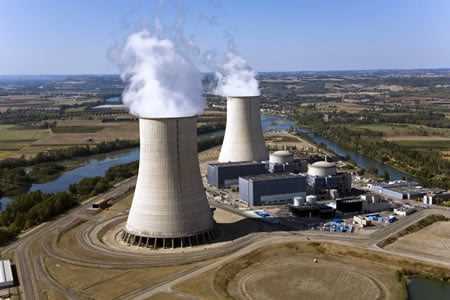(Updated with quotes, context)
PARIS, Jan 19 (Reuters) – The French nuclear industry will need a “Marshall plan” to carry out new projects, the Nuclear Safety Authority (ASN) warned on Wednesday, which is also calling on France to re-examine the scheduled closure of 12 reactors and alert on increasingly fragile management of spent fuel from the EDF fleet.
After the announcement by Emmanuel Macron in November of the relaunch of the construction of reactors in France, a project on which the Head of State did not provide any details, the ASN underlined on Wednesday that the sector, to face new projects, dismantling operations and work on the current fleet, should recruit nearly 4,000 engineers per year in the years to come.
“If nuclear power is one of the choices to ensure a carbon-free and robust energy mix by 2050, the sector will have to put in place a real Marshall plan to make this prospect industrially sustainable and have the skills to enable it to face the scale of the projects and their duration”, warned the president of the ASN, Bernard Doroszczuk, during a presentation of his wishes to the press.
While judging that the safety of nuclear installations in France remained at a “satisfactory” level in 2021, the ASN also recalled on Wednesday that the country’s electricity system no longer had margins in terms of production, in particular in the context of the shutdown of five reactors for a “serious” problem of corrosion on safety circuits.
Bernard Doroszczuk thus once again called on the public authorities to show anticipation by estimating that, in the next five years, the choice displayed for the definitive shutdown of 12 additional reactors by 2035 should be “duly weighed” at the regard to “realistic” prospects for commissioning new means of production at the same time.
“PUTTING BACK ON THE TABLE” REACTOR CLOSURES
“Maintaining margins must be in the minds of decision-makers and, in this respect, this decision must be put back on the table (..) to ensure that it will not be contrary to the expressed needs for production with regard to the electrification of uses”, said Bernard Doroszczuk.
“Should we close them? Will we need them? (And) at the same time (..) are there security reasons for closing them? That’s what we want to anticipate.”
EDF will also have to question and justify its ability to extend the operation of its oldest reactors beyond 50 years, also underlined the ASN.
A series of events is also weakening the entire fuel cycle chain in France today, with first of all the delay in the launch by EDF of the construction of a centralized storage pool to deal with the foreseeable saturation of La Hague facilities by 2030.
In addition to this delay, the ASN pointed to an aggravation of the operating difficulties of the Orano Melox recycling plant, in Marcoule (Gard), which induce “a saturation from 2022 of the storage capacities of plutoniferous materials”.
These problems, combined with faster-than-expected corrosion of certain equipment at La Hague, risk in turn “weakening the operation of nuclear power plants insofar as they could no longer evacuate their fuels”. (Report Benjamin Mallet, edited by Jean-Stéphane Brosse)
